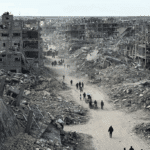Makawanpur, Nepal, 3 June 2013 – Enhancing people’s access to justice is crucial in the fight against impunity for human trafficking in Nepal. Together with its partner NGO, the Forum for Protection of People’s Rights (PPR) and the local district bar, Avocats Sans Frontières (ASF) is organising mobile legal clinics as a way to counter this widespread phenomenon. Thanks to these mobile legal aid centres, communities are sensitised about their rights and are provided with counselling when they face legal problems.
Over the past few years, human trafficking has become an increasingly severe problem in Nepal. Men, women and children run the risk of being abducted, transported and exploited or sold by means of coercion.
“Trafficking mainly occurs for the purpose of organ transplants, marriage, prostitution and domestic servitude, mostly in countries abroad. India, Korea, Hong Kong (*), China, Tibet (**) and the Gulf countries are the main destinations”, explains Mr. Mukunda Adhikari, PPR’s District Coordinator. It is estimated that about 11,500 people were trafficked or attempted to be trafficked in 2011 – twice as much as in 2010. Every year, 5,000 to 7,000 women and girls are being trafficked to India for prostitution.
To address this problem, the district bar of Makawanpur, PPR and ASF have decided to organise specific mobile legal clinics around human trafficking.

The legal clinics are taking place on a monthly basis in three municipalities and target representatives of the police, women groups, community-based organisations and other lawyers, as well as affected populations. They are conducted by two lawyers from the district bar association. During the first awareness-raising part of the clinic, they clarify legal issues relevant to local context or raised by the participants, such as human trafficking, fundamental rights, and women rights. Afterward, they provide legal counselling, for example, about the procedure to file complaints in the case of a human trafficking incident. If people need court representation, the clinic refers them to the district bar association, where they are provided with free legal aid.
Recently, in Hativa, this particular initiative gained the support of a district court judge, Mr. Tek Narayan Kunwar, who participated and interacted with the attendees. “The challenges in tackling human trafficking are various”, he said. “Its underlying causes vary from one victim to another; they range from poverty and unemployment to discrimination and impunity. This complexity makes human trafficking tough to tackle”.
Mr. Gopi Parajuli, ASF Head of Mission in Nepal: “By supporting the mobile legal clinic, we are contributing to enhancing people’s access to justice and to combatting impunity in Nepal.”
(*) (**) respectively Special Administrative Region and Autonomous Region of China

Cover picture © Kate Holt/IRIN



